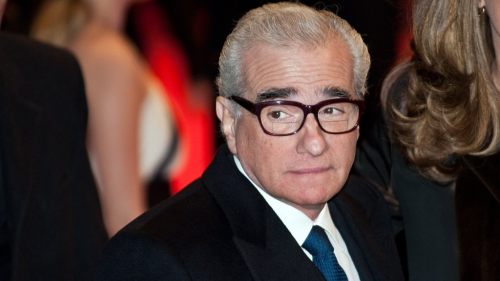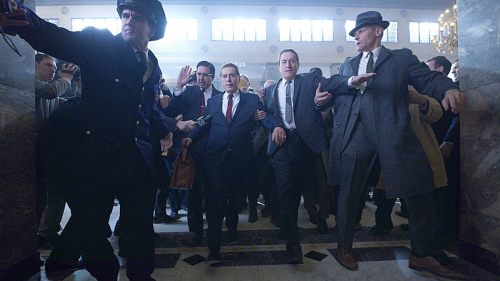AFI Review: SILVER LININGS PLAYBOOK Is Strong Fluff
David O. Russell's days as a dangerous director are behind him. He seems to be done with films like Spanking the Monkey or Three Kings or the existential romcom I Heart Huckabees. Those were movies that pushed boundaries, that made you uncomfortable or that made you really think and engage. They weren't general audience pictures, per se, despite the fact that Russell's dry, witty, engaging style appeals to the general audience. And that, in many ways, has been his greatest gift - to smuggle some very subversive content (seriously, look back at Three Kings) into movies that feel multiplex friendly.
But any filmmaker's angry and edgy days run out eventually. The Fighter showed a new Russell, one who was happy to embrace a schmaltzy, mainstream formula film and bring his sense of edge to it. With The Fighter - and more than ever now with Silver Linings Playbook - David O. Russell has totally reversed course. Now instead of smuggling edge, he's bringing the illusion of it. He's making mall movies and convincing art house people they're cool.
As they said on Seinfeld, there’s nothing wrong with that. It’s sort of a bummer to watch one of the best talents of the 90s settle into a middle of the road space. But at the same time it’s not so bad because Russell has barely lost a step as a filmmaker. Silver Linings Playbook is the sort of feel-good claptrap that normally irritates me, but Russell plays it with the pitch and verve of a classic screwball comedy. This is a fast-paced, funny movie... which weirdly is also my problem with it.
The premise: generally hateable Bradley Cooper plays Pat, a Philly guy (an Italian! I’ll let this one go, Russell) who is just getting out of the looney bin. He was undiagnosed bi-polar, and his illness led to an incident where he almost beat a man to death. The man happens to be his wife’s lover; out of the nuthouse Pat harbors delusions that his wife will still want to get back with him. He begins getting in shape and reading her syllabus (she’s a high school English teacher) to prove himself.
He’s forced to move back home with his parents, Jacki Weaver of Animal Kingdom and Robert De Niro of Rocky & Bullwinkle. Pat’s dad has lost his job and is now a football bookie, but his OCD superstitious rituals make Sundays anxious around the house. Amid all of this, Pat meets Tiffany, played by Jennifer Lawrence of The House At The End of The Street. She recently lost her cop husband and has become quirkily depressed, and has developed some sort of nymphomania. She's getting ready for a big dance competition and needs Pat's help.
If all of this sounds too precious for words, it is. Russell, who adapted Matthew Quick’s novel himself, has the talent to make it work. The energy and comedy often make you forget that these characters are drowning in quirk, even if that quirk is now properly diagnosed and treated with medication. But that speed and that comedy kept me from every fully emotionally investing in the film; everybody’s illnesses are played so light that they’re almost inconsequential. It’s funny when Pat accidentally elbows his mom in the nose during a rage freak out, not scary. Weepy moments of revelation feel perfunctory, and Tiffany’s big reveal - the secret origin of her nuttiness - is actually laugh out loud ridiculous.
Russell’s turn to the mainstream includes some of the most insistent camera work of his career. It’s not just the big kiss that is shot - I shit you not - by a camera whirling around the couple, it’s the way the camera hastily zooms in on or cuts to things in the frame. When Pat is talking about his wife with his therapist (side note: his therapist is Indian. This is the sort of movie that, when we finally meet the therapists’ wife, she’s wearing a sari. Because they’re Indian) the camera zooms in on his wedding ring. When Pat begins falling for Tiffany, the camera zooms in on him knocking the English required reading off his bed. It’s heavy, it’s underlined, it’s obvious. It’s for the mall crowds. He’s playing to the back of the room.
As I said the energy and the comedy ameliorate some of that broadness. The cast does their fair share as well. Cooper, who has a face I legitimately cannot stand (he looks like a smirking stockbroker Satan all the time) turns in a vital and human performance as fucked up Pat. This is kind of an unlikable character in many ways, but if you know anything about David O. Russell’s past you’ll understand why this character spoke to him. I imagine the director worked closely with Cooper to really delve underneath the explosive anger and delusion; it’s no Punchdrunk Love, but it works.
De Niro is wonderful. It’s so rare we get to say that anymore, and maybe he’s used up his amount of wonderful for the rest of his career, but it’s hard to fault him here - except for the big crying scene that’s going to be his Oscar clip reel. Otherwise he’s playing a real character, not just a caricature. This isn’t Meet The Fockers all over again; his Pat Sr. has depth and pain. He’s actually the best and most interesting character in the film, for me. (I actually found the football business in the movie way more engaging than just about anything else.) Besides the fact that I recognize Italians of this generation (and the art direction on their house - impeccable. It was like walking into my grandmother’s place), De Niro brings the weight of his life to the role. On top of that the character’s motivation - he wants to understand his son, who is so like him in so many ways - is the simplest and most honest motivation in the film.
The other big winner is Jennifer Lawrence. If, by some weird chance, you’re not already in love with her, Silver Linings Playbook will fix that. She’s fierce and sexy and, like every other damaged character in this piece, vulnerable. That she’s one of the finest actors (of any gender) of her generation is beyond doubt now, and having her in a movie like this truly elevates the froth to another level.
But froth it is. And there’s nothing wrong with that! Some of the best comedies of the 30s and 40s are frothy. Froth is delightful. Many of the great Ernst Lubitsch and Billy Wilder movies could be described as having a certain frothy quality to them. Silver Linings Playbook is not in that rarefied air, but that does seem to be what David O. Russell is aiming for. I liked the movie, found it funny and enjoyable if slight.
What’s interesting to me is looking at the evolution of quirky movies like this. Harold and Maude seems to be the spring from which all of the Little Miss Sunshines and Lars and The Real Girls have sprung, and in many ways Silver Linings Playbook can trace its ancestry back to that. But whither the actual oddness that Hal Ashby brought to that classic? Why have we replaced weird Bud Cort and old Ruth Gordon with studly Bradley Cooper and it girl Jennifer Lawrence? In a lot of ways Harold and Maude feels like a true outsider’s response to the Lubitsch, Capra and Hawks films, but the new generation of quirky films has stripped away the outsider aspects. Technically these characters remain outsiders, whether they’re weirdos like Lars or diagnosed neurotics like Tiffany and Pat in this film, but they’re played by beautiful people. Silver Linings is better than the other films in the modern Oscar-bait quirk genre, but it’s still a feel good aspirational movie that coats dysfunction in glamour.



